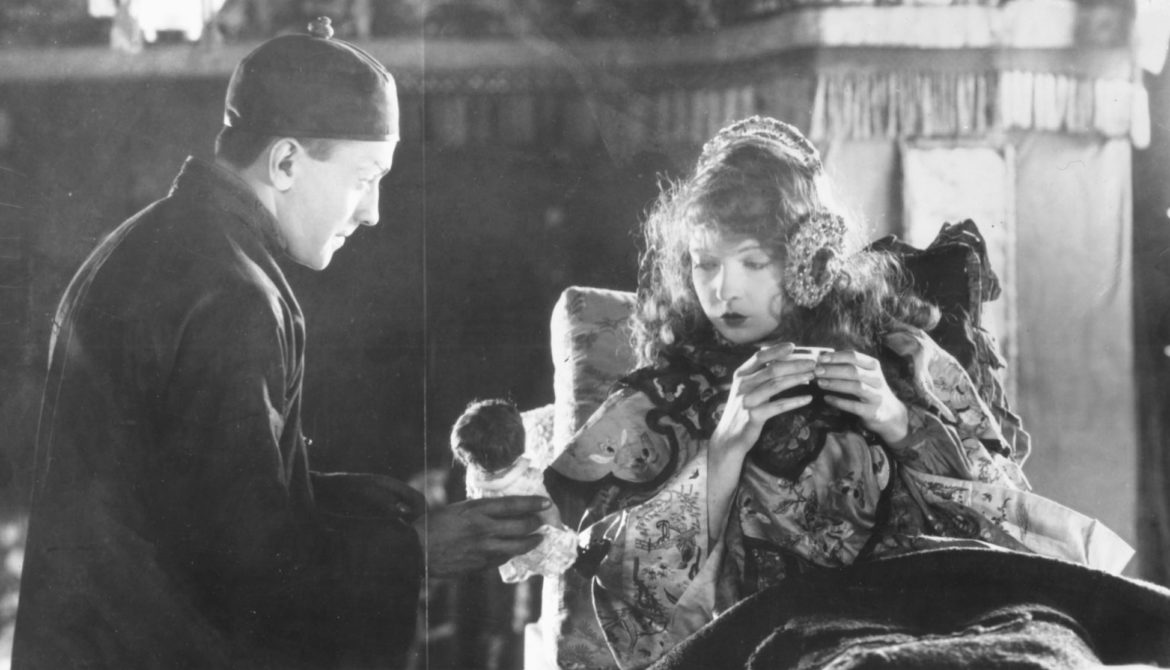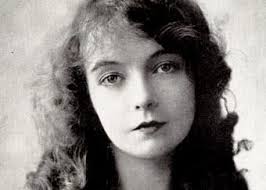Part of an ongoing effort to watch each of the films in Roger Ebert’s Great Movies series. The introduction and full list can be found here.
“It is a tale of temple bells, sounding at sunset before the image of Buddha; it is a tale of love and lovers; and it is a tale of tears.”
So begins Broken Blossoms. That opening title card conveys much of the film. Deeply melancholy, poetic, and rushing headlong into tragedy, the film draws from a deep well of exoticism but still manages something approaching empathy.
Unlike Griffith’s revered/reviled Birth of a Nation, its heart is firmly in the right place. Where his film from 5 years prior exalted racist terror groups, turned history on its head to suggest that southern whites were merely defending themselves from black tyranny, and could only conceive of interracial relationships in terms of assault and violation, Broken Blossoms is at its best depicting the halting, dangerous love between a Chinese merchant and an abandoned white girl cruelly abused by life.
Her tormentor is her boxer father Battling Burrows, but more generally it’s white, patriarchal society to blame, along with rigid class structures. Most of the Broken Blossom’s outrage and sorrow is directed at poverty and its consequences, with a strong rebuke of the anti-Asian xenophobia of its white characters. Many critics argue that Broken Blossoms is Griffith’s attempt to atone for Birth of a Nation. Watching the two in relatively close proximity, it’s not at all an implausible theory. In some ways, they are mirror images of each other.
In other ways, they are not. Birth of a Nation’s blackface is replaced by lead Richard Barthelmess’ yellowface, as well as Edward Peil Sr.’s, in the role of “Evil Eye.” This is a film subtitled “The Yellow Man and The Girl”, and one in which Barthelmess’ very nuanced, tender protagonist is also called “Chinky” (in a tender moment with Lillian Gish’s Lucy, no less) and plays a flute to help his would-be lover back to health. He’s a mysterious Other positioned as an early, Chinese incarnation of the Magical Negro – steadfastly bringing the Buddha’s message of peace to the whites to help them find themselves, while also nursing beaten and abused white women back to health with his love, and flute music. But he’s doomed by the strictures of a racist society. Broken Blossoms wants to castigate an unjust society that would deem this love illegitimate and fail to recognize what he has to offer the world (peace, flute music), and it wants to do this by playing up every exotic aspect of his being for a white audience.
Even when racists try to atone for their racism, they end up kind of racist.
On the other hand, having just watched Birth of a Nation for the first time, I will gladly take this version of Griffith. The shots are beautifully composed, there are numerous depictions of street life that feel real while managing to avoid condescension, and title cards are for long sections of the film nonexistent (relying on the actors to convey the drama, especially the wondrous Gish, who almost literally shines here).
And ultimately, for all its exoticism, it’s never really nasty, at least by Birth of a Nation standards – the film carries a humanist and empathetic message, even as it bows to the convention of the time by casting a white actor in the lead role and relegating actual Chinese people to the margins. It repudiates the violence of white supremacy and patriarchy, and instead exalts love and kindness, though it doubts they can triumph in this world.
All of which is much, much better than watching the Klan ride heroically into town.
We open with Barthelmess trying, and failing, to make peace between squabbling white soldiers. (I will refer to the actor throughout, largely because I am just not going to write “The Yellow Man” over and over.) He is positioned from the start of Broken Blossoms as a proselytizer for peace in a hostile world of violent, irrational whites, preaching the Buddha’s message (which it turns out is a verbatim rendering of the Golden Rule) and being roundly ignored. He’s shaken by the experience but, determined, takes leave of his family to make his way in the world, and hopefully make it a better place. One of the relatively few cards hints at Griffith’s tone and intent, describing the advice of the young man’s father: “Word for word such as a fond parent of our land would give.” The appeals to empathy and cross-cultural understanding come early and often.
Barthelmess ends up in the slums of London years later, making a living as a storekeeper and frequently haunting the neighborhood’s rather well-attended opium den. His disillusionment is clear, and Griffith’s framing in the opium den scenes conveys it well – this is not what he signed up for. The slums of London don’t seem ready for the message of the Buddha.
His one ray of light is Lucy, who he spies from time to time from his shop window. She’s angelic but also beaten down by the world, literally – her contemptible boxer dad abuses her both physically and emotionally, playing cruel tricks on her for fun when not beating the shit out of her outright. Gish staggers about through Broken Blossoms with a hunched back, furtive, downcast eyes, and a deep sadness – when dad demands she smile, she has to use her fingers to try and simulate one. It would be a corny gesture now, but in context, it’s awfully sad. That Griffith expends so much energy on close-ups of her face doesn’t hurt – the unmistakable sense is of ethereal beauty in the gutter, and the deep injustice of good people dealt bad hands.
So Barthelmess and Lucy are both adrift in the world, without family in one case and all too burdened with family in the other. After a particularly vicious beating, Lucy escapes to the street and passes out in front of his shop. Without a thought, he takes her in and appoints her upstairs in a bed to rest.
Over time, her wounds heal, a bond forms between the two broken souls, and she presumably comes to adore the sonorous sounds of Barthelmess’ flute. Lucy is transformed in the absence of her dad and previous circumstances, turning luminous and beautiful, much like Ally Sheedy in The Breakfast Club if Ally Sheedy hadn’t already been gorgeous before Molly Ringwald did her hair. In any case, these scenes in Broken Blossoms are intimate and tender; cross-cut with Battling Burrows in the boxing ring, dismantling his opponents, they’re also packed with dread. Their idyllic romance can’t last.
And indeed it doesn’t. Burrows hears about their connection from a local spy and laughs it off as ridiculous, that anyone could love someone so humble and without note as, well, Lillian Gish. Upon realizing that this particular anyone is a Chinese storekeeper, he flies into a rage and confronts them, with predictably tragic consequences.
The cross-cutting between the would-be lovers and the boxing ring, between scenes of exquisite tenderness and proto-Raging Bull violence, is one of the film’s key achievements. Griffith explored this in Birth of a Nation, juxtaposing battle scenes with a somber family dinner, but here it’s much more accomplished and effective at building tension. There’s little doubt where things are headed, and his set-up is more than a little heavy-handed, but the feeling is palpable: you root for Barthelmess and Lucy’s gentle kindness, even as the evidence mounts that the world has no place for it.
I don’t mean to paper over the exoticism, but it really is deployed in this case for something like noble ends. Broken Blossoms is firmly with us on the side of the lovers, and horrified but unsurprised at the xenophobia and injustice of the larger society they inhabit. Unfortunately, Griffith once again, even despite himself, gave form to pernicious stereotypes that haunt movies to this day. As in Birth of a Nation, which he really seems not to have noticed was virulently racist, these ideas are taken for granted. Unlike Birth of a Nation, this is a story worth telling, even if it’s been told a thousand times, and it carries a clear message – love might not conquer all, but it’s better than the alternative.
Ebert’s review is here. Favorite line:
Griffith in 1919 was the unchallenged king of serious American movies (only C.B. DeMille rivaled him in fame), and “Broken Blossoms” was seen as brave and controversial. What remains today is the artistry of the production, the ethereal quality of Lillian Gish, the broad appeal of the melodrama, and the atmosphere of the elaborate sets (the film’s budget was actually larger than that of “Birth of a Nation”).
And its social impact. Films like this, naive as they seem today, helped nudge a xenophobic nation toward racial tolerance.
There is all of that, and then there is Lillian Gish’s face. Was she the greatest actress of silent films? Perhaps; her face is the first I think of among the silent actresses, just as Chaplin and Keaton stand side by side among the men. When she was filming “The Whales of August” in 1987, her co-star was another legend, Bette Davis. The film’s director, Lindsay Anderson, told me this story. One day after finishing a shot, he said, “Miss Gish, you have just given me the most marvelous closeup!” “She should,” Bette Davis observed dryly. “She invented them.”
Next up: The Cabinet of Dr. Caligari


